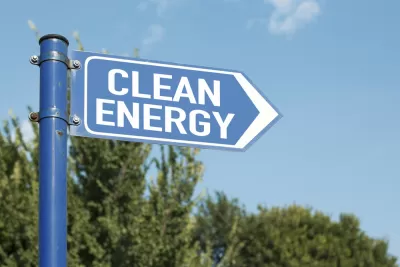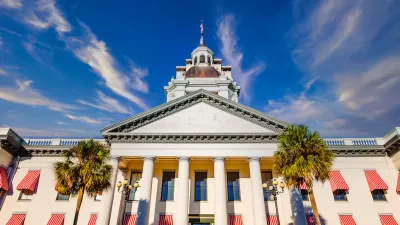As the details of the $3.5 trillion budget package under development in the U.S. House of Representatives begin to emerge, so to do the potential climate change benefits.

A team of researchers at the Rhodium Group has calculated the greenhouse gas emissions at stake in the $3.5 trillion, ten-year budget package currently under consideration in Congress (a package which includes the $550 billion in new spending included in the Infrastructure Investment and Jobs Act.
Recent work on the budget package in the House of Representatives has made it possible for the Rhodium Group to begin estimating the greenhouse gas (GHG) emissions implications of the bill. The team at Rhodium Group identifies a few stand outs among the investments proposed in the current versions of the budget package, including six investments that would cut nearly 1 billion tons of carbon emissions compared to taking no action. "That is up to ten times larger than the impacts we quantified for the Energy Act of 2020, enacted at the end of last year," according to the article. "It’s roughly equivalent to zeroing out annual emissions from all light-duty vehicles on the road or the annual emissions from Texas and Florida combined."
The six big ticket items identified by the Rhodium Group are a clean energy tax credit program, a Clean Electricity Performance Program, funding for rural electric cooperatives, a new electric vehicle tax credit, a fee on methane emissions, and increased funding for carbon removal through soil conservation and reforestation. The biggest source of carbon reductions under the current bill would come from the energy sector.
The potential for significant greenhouse gas emission reductions to come from the energy sector is buoyed by recent research out of Oxford that quantifies the recent reduction of cost for clean and renewable energy production and models out future trends. According to an article by Bill McKibben explaining the research, the coming transition to renewable and clean energy "will likely result in overall net savings of many trillions of dollars--even without accounting for climate damages or co-benefits of climate policy."
As noted in the source article, the budget package has the potential for even more impact from additional projects if or when it proceeds through approval.
FULL STORY: Pathways to Build Back Better: Nearly a Gigaton on the Table in Congress

Manufactured Crisis: Losing the Nation’s Largest Source of Unsubsidized Affordable Housing
Manufactured housing communities have long been an affordable housing option for millions of people living in the U.S., but that affordability is disappearing rapidly. How did we get here?

Americans May Be Stuck — But Why?
Americans are moving a lot less than they once did, and that is a problem. While Yoni Applebaum, in his highly-publicized article Stuck, gets the reasons badly wrong, it's still important to ask: why are we moving so much less than before?

Using Old Oil and Gas Wells for Green Energy Storage
Penn State researchers have found that repurposing abandoned oil and gas wells for geothermal-assisted compressed-air energy storage can boost efficiency, reduce environmental risks, and support clean energy and job transitions.

Minneapolis Bans Rent-Setting Software
Four cities have enacted restrictions on algorithmic software that can inflate rent costs.

Oakland to Add 244 New EV Chargers
Oakland plans to launch its new charging network at eight locations by the end of 2025.

Jane Goodall Inspires with Message of Hope, Resilience, and Environmental Action
Speaking in Pasadena, Jane Goodall offered a hopeful and inspirational message, urging global compassion, environmental responsibility, and the power of individual action to shape a better future.
Urban Design for Planners 1: Software Tools
This six-course series explores essential urban design concepts using open source software and equips planners with the tools they need to participate fully in the urban design process.
Planning for Universal Design
Learn the tools for implementing Universal Design in planning regulations.
Heyer Gruel & Associates PA
City of Moreno Valley
Institute for Housing and Urban Development Studies (IHS)
City of Grandview
Harvard GSD Executive Education
Salt Lake City
NYU Wagner Graduate School of Public Service
City of Cambridge, Maryland





























